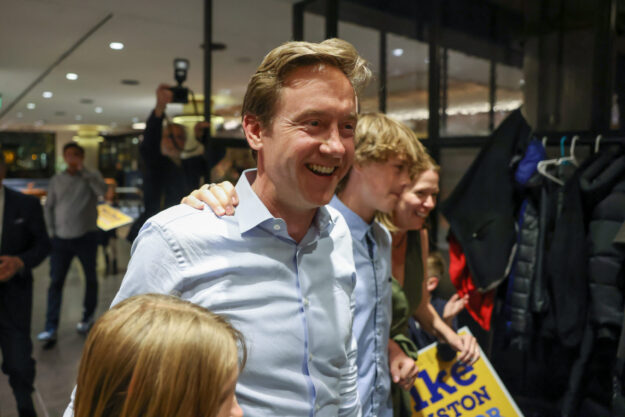Widgetized Section
Go to Admin » Appearance » Widgets » and move Gabfire Widget: Social into that MastheadOverlay zone
Educator, lawmaker, Vail native Johnston headed to June runoff election for Denver mayor’s seat

Initial election results on Tuesday night showed the two best-funded candidates leading a crowded field of Denver mayoral hopefuls in the race to secure the two spots in June’s head-to-head runoff.
Vail native Mike Johnston, a former state senator and onetime candidate for both Colorado governor and U.S. Senate, led the 16-way race with 24.7% of the 104,027 votes counted as of 11:30 p.m. on election night, according to preliminary results.
Kelly Brough, a former chief of staff to then-Mayor John Hickenlooper and the longtime head of the Denver Metro Chamber of Commerce, narrowly trailed Johnston with 22.3% of the vote.
Brough and Johnston are by far the race’s leading fundraisers, both collecting more than $670,000 in direct contributions as of March 29, according to campaign finance disclosures. Johnston has also benefited from more than $2.2 million in outside spending by a group funded in large part by billionaires Reid Hoffman and Steve Mandel, while a pro-Brough group has spent nearly $1 million raised from a variety of local real-estate development interests. Johnston is the son of the late Vail Mayor Paul Johnston, owner of Vail’s Christiania Lodge.
Lisa Calderón, a progressive activist and criminal justice professor who placed third in the 2019 mayor’s race, and Andy Rougeot, the race’s lone self-identified Republican and the son of a wealthy cosmetics executive, trailed well behind the leaders, with 15.2% and 12.9% of the initial vote, respectively.
Two current state lawmakers appeared on track to fall well short of a spot in the runoff. Democratic state Rep. Leslie Herod, a progressive champion of criminal justice reform at the Legislature, had received just 9.5% of the vote as of 11:30 p.m. State Sen. Chris Hansen, a top clean-energy advocate who took a hard line on homelessness and crime in the mayor’s race, stood at 5.2%.
City Councilmember-at-Large Debbie Ortega, who has served on City Council for a combined 28 years in two stints since 1987, had received just 4.6% of the vote in the initial results. No other candidate exceeded 1.5% support.
Denver elections officials had warned ahead of Tuesday’s municipal election that a late surge in ballot returns could mean “waiting past Tuesday night for results.” Shortly before midnight, officials said that an estimated 65,000 ballots remained to be processed, and the next update would come midday on Wednesday.
Possible Brough-Johnston matchup
One of the first high-profile candidates to jump into the race, Brough has billed herself as “the only candidate for mayor who has actually managed the city.” She served as Hickenlooper’s chief of staff from 2006 to 2009.
She then spent 12 years leading the Denver Metro Chamber of Commerce, a conservative business lobbying group. In seeking election as mayor of a heavily Democratic city, Brough has faced scrutiny over her tenure at the head of one of the chief foes of liberal policymakers at the statehouse, battling Democrats in the majority as they fought to pass new environmental regulations, health care reforms, a paid family leave program and more.
She has endorsed a return of “qualified immunity,” a legal doctrine that bars people from suing law enforcement officers in their individual capacity, as a way to aid the Denver Police Department’s recruiting efforts, and has spoken of arresting unhoused people who refuse shelter or treatment services as a “last resort” to address homelessness.
A former school principal and education advisor to former President Barack Obama’s 2008 campaign, Johnston served two terms in the state Senate beginning in 2009, and placed third in the 2018 Democratic gubernatorial primary. He then launched a challenge against former Republican U.S. Sen. Cory Gardner in 2019, but withdrew following Hickenlooper’s entry into the Democratic primary.
Johnston prioritized education reform in the Legislature, drawing opposition from teachers’ unions for spearheading efforts like 2010’s Senate Bill 191, a law that overhauled Colorado’s teacher-evaluation system. Between January 2020 and announcing his campaign for mayor late last year, Johnston served as CEO of Denver philanthropic organization Gary Community Ventures, helping lead a successful effort to pass Proposition 123, a statewide affordable housing initiative.
As a candidate for mayor, Johnston has promised to “end unsheltered homelessness in my first term,” laying out a plan centered on “micro communities” made up of tiny homes and converted hotels. His housing plan also targets the creation of 25,000 “permanently affordable,” income-restricted housing units over the next eight years.
Denver’s runoff election will be held on June 6. Ballots will be mailed to voters beginning May 15.
Editor’s note: This story first appeared on Colorado Newsline, which is part of States Newsroom, a network of news bureaus supported by grants and a coalition of donors as a 501c(3) public charity. Colorado Newsline maintains editorial independence. Contact Editor Quentin Young for questions: info@coloradonewsline.com. Follow Colorado Newsline on Facebook and Twitter.


